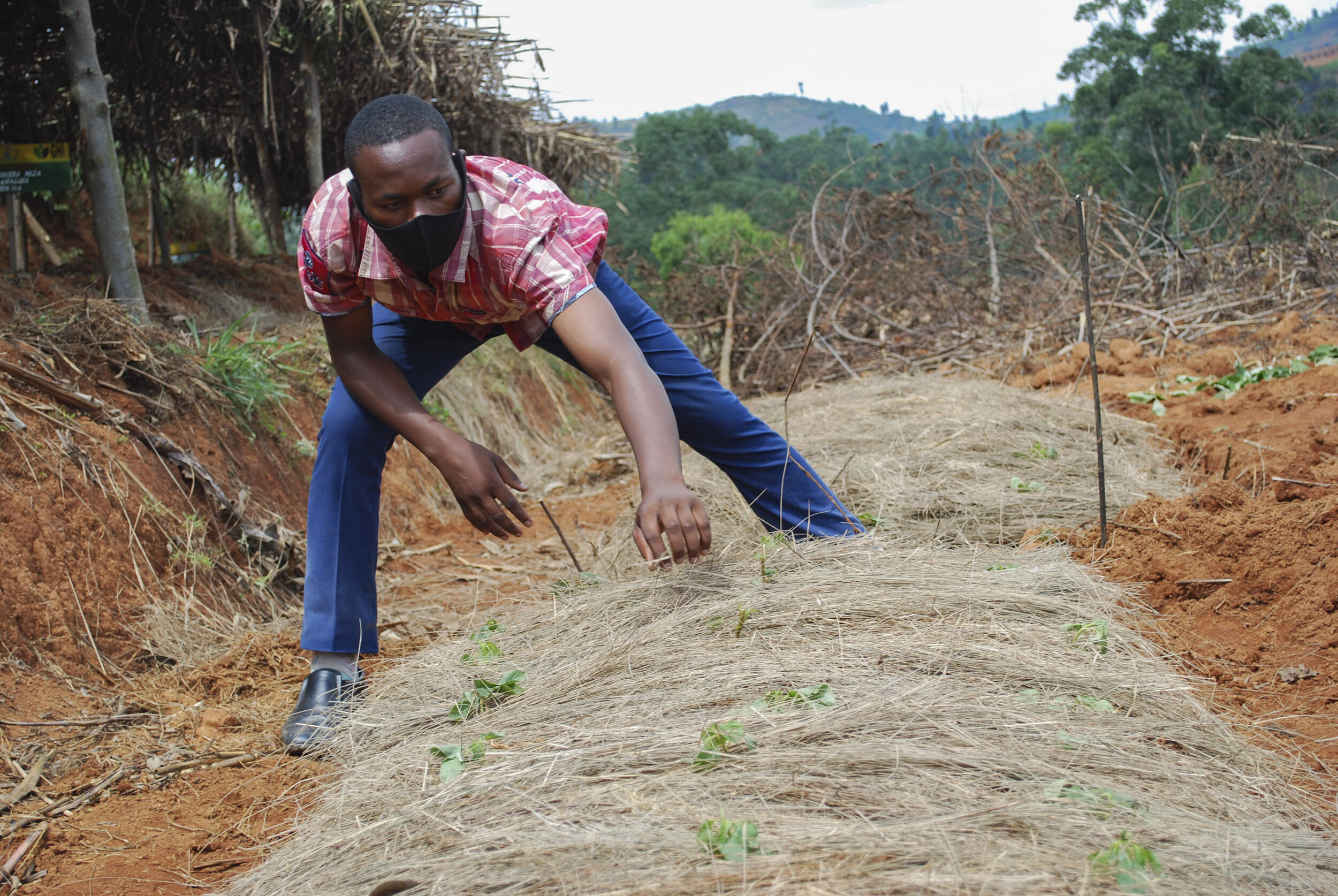School gardens and the changemakers driving community health
Home gardens continue to ensure access to nutritious, sustainable sources of food during the COVID-19 pandemic — not only for individual families, but for entire communities. Check out the inspiring stories that have come from our partnership with the UN World Food Programme, from feeding six additional families in a time of need to creating learning spaces that extend beyond school campus.
Meet Margarithe.
Margarithe is a farmer in Karama Village, southern Rwanda. She has two young children at home, and her eldest, her ten-year-old son, is in school. “My son is part of the agriculture club at school, and he’s become very passionate about agriculture.”
In fact, despite his young age, Margarithe has learned a lot from her son. “He does the gardening at home. He’s even the one who initiated the idea of having double-dug garden beds at home, and we supported him.” Margarithe grows staple crops like beans and corn to sell at the market, along with some of her favorite veggies for eating: leafy greens in the garden by her home, and carrots in the next valley over. “I include veggies in (almost) every meal. I might miss the occasional meal during the dry season, but we love veggies at home. My kids especially like amaranth.”
Margarithe has attended two nutrition sessions at her son’s school, where she learned how to prepare a balanced meal using four colors. “Without vegetables, the meal is simply not balanced. Veggies increase your immunity and help with things like healthy vision.” She’s taken the lesson of good nutrition to heart, even sharing her harvest with six families during the current COVID-19 pandemic. “My garden is important, as it gives me a constant supply of vegetables at home. During COVID, my family had enough vegetables, and I could even provide to other parents.”
As a changemaker herself, Margarithe has similar wishes for her children: “I wish for my children to be healthy, achieve their goals, and be role models and agents of change in my community.”
Meet Francoise.
“Education can only be successful when students are healthy,” nods Francoise. “Our nutrition trainings help people understand the ‘why’ of a balanced meal. It equips parents to understand the health benefits of vegetables, and it equips community members with the capacity to raise healthy children who are capable of performing to their fullest potentials.”
Francoise is the leader of Nyamushishi Cell in eastern Rwanda. She works closely with schools in the Home Grown School Feeding Initiative in her cell, and her job includes everything from organizing seedling distribution for local school families to providing key nutrition messages during that distribution. She’s even spearheaded establishing gardens at students’ houses, and her work has become especially important in recent months.
“I think COVID-19 made people give more value to agriculture, especially to home gardens. The pandemic led to increased unemployment, which in turn led to worsened nutrition status among those without access to a garden or vegetables. So, during the country-wide lockdown caused by COVID, we saw people start their own gardens.” Francoise recently assisted five such families to create their own home gardens.
“School gardens are particularly helpful to the local community. From the school garden, we can distribute seedlings. Additionally, the gardens are a source of nutritious vegetables, which we can distribute to vulnerable families during this time.”
Francoise even brought school garden lessons into her own home. “The trainings opened my mind toward how to mobilize other home gardens – they’re easy to install, and use locally available materials. I established my own double-dug beds and sack garden at home, and I started growing crops like kale and radish that were new to me.”
Now, Francoise is busy encouraging others. “My aim is to have a malnutrition-free community, and that this knowledge reaches beyond our school campuses.”
Meet Claude.
Musange Primary School’s gardens are a source of pride, says head teacher Claude. “They’ve been a space for learning, for both students and teachers. The gardens are a source of information, and as we all know, knowledge is power. They’ve changed students’ attitudes around gardening, through education.”
Despite school closures related to the COVID-19 pandemic in recent months, school garden activities haven’t stopped at Musange Primary. “We mobilized teachers, the agriculture club, and interested community members to maintain the garden. They come once a week, to plant seeds, contribute manure and mulching materials, or maintain the seed bank.”
The seed bank has been a focus of the school during the pandemic. “We’re multiplying seedlings, to distribute to families and reach as many students as we can,” explains Claude. “I’m worried about food insecurity resulting in poor nutrition during COVID. This would have ripple effects on students' performance in school. Unemployment has increased, and uncertainty surrounding school re-openings sometimes led to poor planning around food production from parents. Students ate more frequently at home, but food production at home did not necessarily increase.”
Musange Primary School is doing its part. “We’re increasing access to nutritious vegetables with seedling multiplication and distribution. We’re engaging the agriculture club in trainings at the school, and those maintaining the garden receive part of the harvest. And we’ve identified 38 vulnerable families around the school to distribute our veggie harvest too, or to harvest their own vegetables from the school when available.”
“The school gardens really link the school to the community,” Claude reflects. “I hope that my students stay healthy, by practicing everything they’ve learned from our agriculture and nutrition sessions. And I hope that they’ll support the rest of their community, by ensuring good hygiene and nutrition practices in their households.”
Story by Jessica Wright, photos and interviews by Godfrey Gatete and Annonciatha Niyibizi










